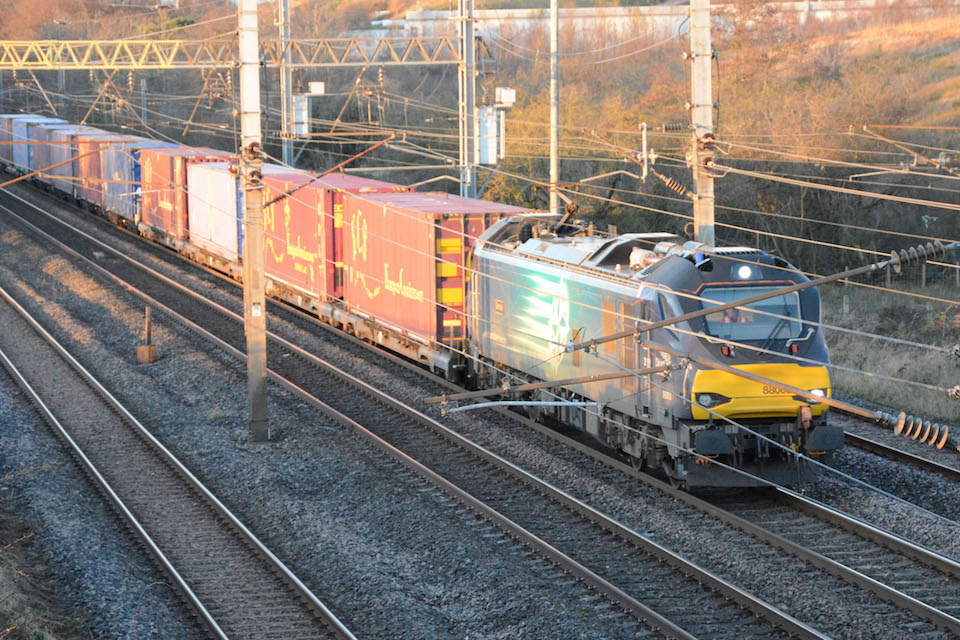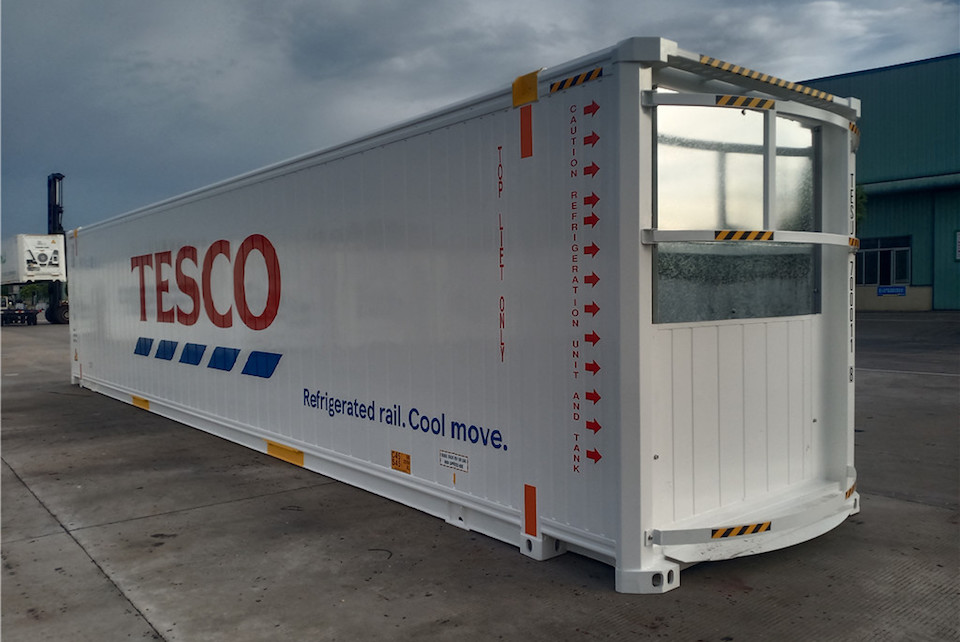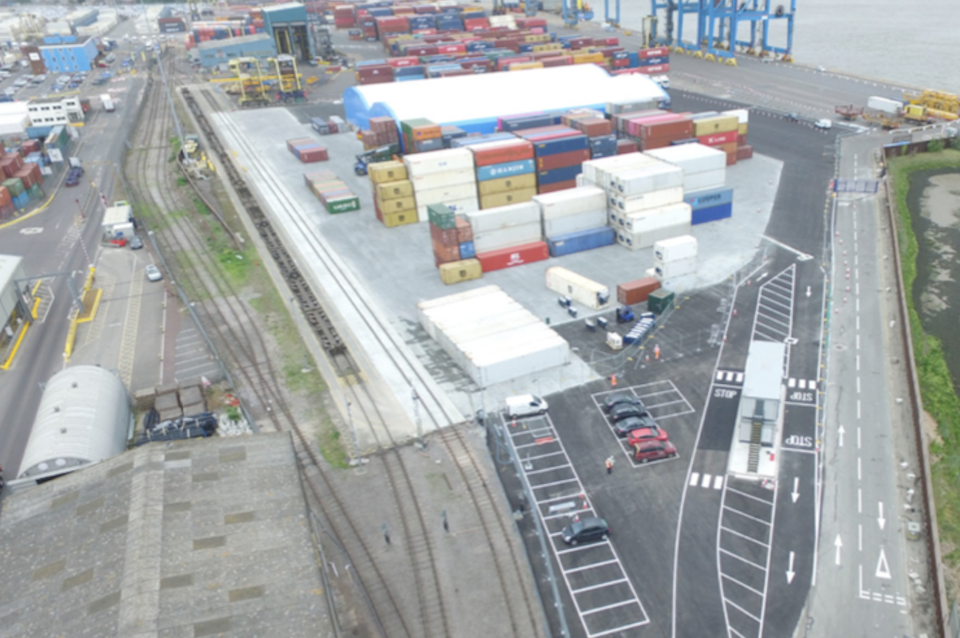Tilbury, Tesco and DRS put less CO2 on supermarket shelves

Launching a new reefer intermodal service, the trio of Forth Ports Tilbury, supermarket chain Tesco, and freight operator Direct Rail Services have partnered up to bring some Christmas cheer to rail operators, road users, and shoppers. In what the partners are calling a cool move to keep emissions on track, a new seven-days-a-week service will run from facilities at the Port of Tilbury near London on an 830-mile (1326 km) round trip to Coatbridge near Glasgow in central Scotland, replacing 40 heavy goods vehicle journeys enroute.
The supermarket chain is a long-standing customer of rail freight in the UK, but this new service represents a significant ramp-up in operations. The connection, delivering goods to stores in central Scotland, will replace 7.3 million road miles with greener distribution according to a joint statement. The move comes amid a serious shortage of road drivers in the UK, and long-distance delivery problems faced by the supermarket, despite generous recruitment incentives.
17,000 containers off the roads
The new service will be the first time Tesco has used refrigerated rail freight in the UK, distributing chilled goods from Tilbury to Coatbridge twice a day, seven days a week. Announcing the ramp-up, Tesco said that rail freight will play an even bigger role in helping to deliver Christmas this year. “Over the next couple of weeks this new service will transport hundreds of different products, including festive favourites such as sprouts, parsnips, carrots, onions, oranges and lemons just in time for that all important Christmas dinner”, said their statement, which read more like a tasty menu.

The 830-mile round trip route will use Direct Rail Services class 88 bi-mode electric locomotives. DRS, the specialist rail freight arm of Nuclear Transport Solutions (NTS), has invested heavily in bi-mode traction as part of its stated aim to produce zero exhaust and greenhouse gas emissions. Assuming the service is maintained after the Christmas rush, the runs from Tilbury alone will take at least 17,000 containers off the road each year, saving 7.3 million road miles (11.7million km) and nearly 9,000 tonnes of CO2e, according to the partners.
Rail gives an edge amid fierce competition
“We’ve been using rail to transport our goods since 2008”, said Jason Tarry, the chief executive of Tesco in the UK and Ireland. Over the past year, the supermarket has increased the number of containers transported by rail by nearly fifty per cent. “This new service reflects our continuing commitment to rail which has clear advantages for our business, our customers and the planet.”

The commercial benefits are clear to Tarry as well. The supermarket sector is fierce competitive in the UK, with tight margins and cut-throat battles for market share. “Our rail service will be an important part of our efforts to deliver a fantastic Christmas for our customers”, added a competitive Tarry. “We continue to increase the number of containers we transport by rail as part of our commitment to reach net zero emissions in our operations by 2035.”
Tilbury spearheads rapid rail growth
The ambitious new service reflects the ambitions for Tilbury, which recently won freeport status in a UK government initiative, and is undergoing extensive development under the supervision of the owners, Edinburgh-based Forth Ports. “Moving goods by rail is the solution to greening logistics in the UK’, said Charles Hammond, their chief executive. “This new chilled goods train will help Tesco deliver their aspiration to move more goods by rail in the coming years, with Tilbury as a central supply chain partner.”

Hammond says rail traffic at Forth Ports has increased by a remarkable tenfold this year alone, as they have brought new facilities online. “We are expecting annual growth in rail to continue to 2030”, he said. “At Tilbury, in the last two years, we’ve enhanced our rail capability considerably by building new rail terminals and barge loading facilities across the port to enhance our customers’ low carbon delivery options.”
New duties for class 88 locos
Looking forward to the new duties for his class 88 bi-mode locomotives, Chris Connelly, NTS Deputy CEO and Rail Director, said this was fantastic news for the commercial partners, and also for the environment. “This is an example of how rail can play an integral part in the race to net zero”, he said. “Each train will remove around 40 lorries from Britain’s roads and save 9,000 tonnes of CO2e. We are thrilled to be working with Tesco on this new service, helping them drive down their carbon footprint as they deliver for their customers throughout the UK.”
As one of Britain’s biggest commercial concerns, Tesco is already a significant user of domestic intermodal services. Their witty take on their own brand logo – with the company name replaced by “LessCO2” – is a familiar sight on rail and road transported containers. Their increasing its use of rail freight is part of its efforts to meet the company’s commitment to net zero emissions in its own operations by 2035.
You just read one of our premium articles free of charge
Want full access? Take advantage of our exclusive offer




